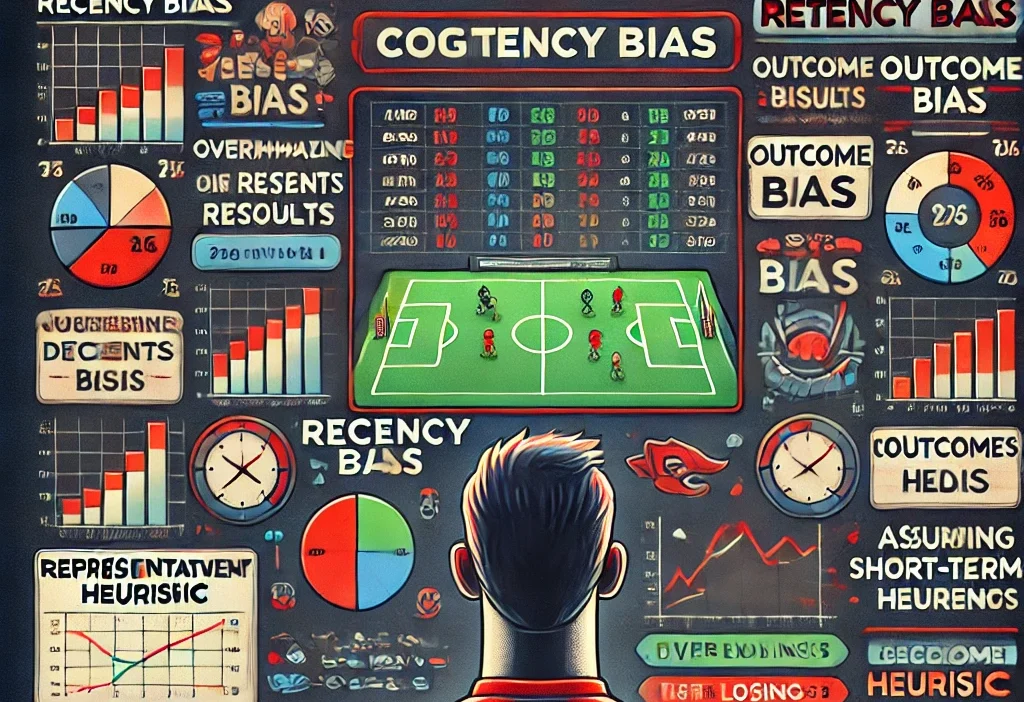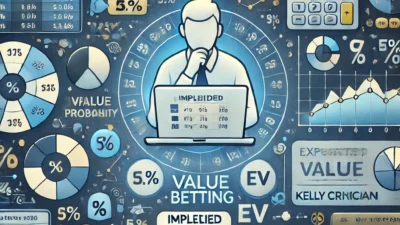Research indicates that cognitive biases significantly influence bettors in sports gambling markets, leading to suboptimal decision-making and market inefficiencies. One of the most prevalent biases is recency bias, where bettors give undue weight to recent performance, particularly recent wins, when evaluating teams or players (Durand et al., 2021; Metz & Jog, 2022). This bias can result in bettors overvaluing teams based on their most recent successes and underweighting the broader context of their past performance. Bettors also tend to overreact to short-term outcomes, such as standout performances or news about player availability, including injuries like those of key players such as quarterbacks, which can lead to distorted odds and mispricing (Durand et al., 2021).
Another common bias is the representativeness heuristic, where bettors place excessive emphasis on a team’s previous season record or short-term performance trends, often overlooking the statistical tendency of teams to regress toward their long-term averages (Woodland & Woodland, 2013). This can result in an overestimation of a team’s true ability, particularly if the team has had a historically strong season. Furthermore, bettors frequently underestimate randomness and chance in outcomes, which leads to an outcome bias. This bias causes bettors to overvalue teams that have had fortunate, random results, while undervaluing teams that have been unlucky (Merz et al., 2021).
These biases all contribute to market inefficiencies, as bettors often make decisions that are not fully rational, potentially resulting in poor betting choices and missed opportunities for profitable wagers (Kan, 2020; Metzger, 1985).
Cognitive biases significantly influence bettors in sports gambling markets, leading to suboptimal decision-making and market inefficiencies
Summary of: Durand et al., 2021; Metz & Jog, 2022
Anecdote
Have a story to share? Write to us at research@bettingresearch.org if you have a related, personal experience you would like to see placed here and share with the community.
Articles Cited
- “R. C. Vergin (2001): Overreaction in the NFL point spread market, https://doi.org/10.1080/096031001752236780
- The study investigates the overreaction bias of bettors in the NFL point spread market, finding that they tend to overweigh outstanding positive performance but not unusual negative performance.”
- “Robert B. Durand, Fernando M. Patterson, Corey A. Shank (2021): Behavioral Biases in the NFL Gambling Market: Overreaction to News and the Recency Bias, https://doi.org/10.2139/ssrn.3861231
- This paper examines the recency bias and overreaction in the NFL betting market from 2003 to 2017, finding that bettors are more likely to bet on teams who have won previous outcomes, and that the magnitude of prior wins and losses plays a greater importance than just the outcome, and that bettors wager less on the home team when their first-string quarterback does not play but more when the visitor’s first-string quarterback does not play, which is consistent with overreaction.”
- “L. Woodland, Bill M. Woodland (2013): The National Football League season wins total betting market: The impact of heuristics on behavior, https://doi.org/10.4284/0038-4038-2013.145
- The National Football League season wins total over/under betting market is highly inefficient, providing opportunities for profitable wagering, which the authors believe is due to bettors incorrectly assessing the objective probabilities of teams’ performance due to the representativeness heuristic and failing to recognize regression to the mean.”
- “Oliver Merz, Raphael Flepp, E. Franck (2021): Underestimating randomness: Outcome bias in betting exchange markets, https://doi.org/10.2139/ssrn.3905961
- The paper examines whether the outcome bias, where people overweight the importance of outcomes when evaluating past decisions, harms price efficiency in betting exchange markets for soccer matches.”
- “Neil Metz, Chintamani Jog (2022): High stakes, experts, and recency bias: evidence from a sports gambling contest, https://doi.org/10.1080/13504851.2022.2099517
- The paper examines the presence of recency bias and the skill of experts in forecasting sports outcomes using data from a season-long sports betting contest called the SuperContest.”
- “A. Kan (2020): Efficiency, Bias, and Decisions: Observations from a Sports Betting Exchange, –
- The paper examines the efficiency of sports betting markets, finding that they serve as good predictors of true outcomes but exhibit a bias where favorites are undervalued and longshots are overvalued, which the authors attribute to behavioral factors like prospect theory rather than information or transaction costs.”
- “P. Newall, Dominic Cortis (2021): Are Sports Bettors Biased toward Longshots, Favorites, or Both? A Literature Review, https://doi.org/10.3390/RISKS9010022
- Sports bettors exhibit biases towards both longshot and favorite bets, with the type of bias depending on the structure of the betting market.”
- “M. A. Metzger (1985): Biases in Betting: An Application of Laboratory Findings, https://doi.org/10.2466/pr0.1985.56.3.883
- The paper demonstrates that three biases in decision-making established in laboratory experiments – the gambler’s fallacy, increasing risk preference within a day, and insensitivity to actual contingencies contradicting expert opinion – can also be observed in the real-world setting of horse race betting of horse race betting.
Insufficient Detail?
At times it is difficult to answer the question as there are not enough relevant published journal articles to relate. It could be that the topic is niche, there’s a significant edge (and researchers prefer not to publish), there is no edge or simply no one has thought to investigate.



